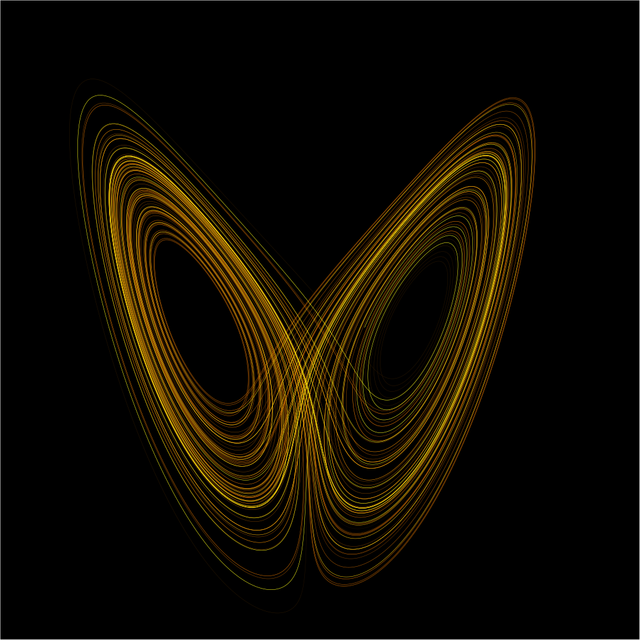Chaos Theory
"When the present determines the future, but the approximate present does not approximately determine the future."-Edward Lorenz
Chaos theory is the scientific concept that the future is caused by the present, and that the approximate future cannot be determined based on the approximate present.
We experience this in our lives on a daily basis. For instance, meteorologists will analyze the present state of weather and attempt to extrapolate what this means for the future weather. Predictions, such as ten-day forecasts are made that frequently do not match the actual outcomes that we experience. It is a common occurrence for a substantial storm to be anticipated that never comes to pass, or for a storm to come seemingly out of no where. This is because the future cannot be reasonably predicted with only a partial picture of the present. Accounting for all variables is impossible and as a result we frequently miss the mark.
At times, the predictions will sufficiently come to pass, as sometimes there are not outside variables that play substantial roles in changing the outcome. For example, the weather forecast for the next hour is much more likely to be accurate than the next week.
This is because time itself plays a crucial role, largely because it gives an unexpected and unaccounted for variable a chance to become a major player in the outcome.
The ramifications of chaos theory also apply to our experiences in life. When we analyze a given situation—such as a relationship—and conclude a particular future outcome, we can find that prediction to never come to pass. We may take action in anticipation and expectation of a predicted outcome, only to find we were mistaken.
The Political Implications of Chaos
In a political setting, this is far more critical than any other consideration made during law making. When a law is passed, the action itself is taken directly because it is believed to be a route to a particular desired outcome. The thought is that, "If we ban something so that it is unlawful, then the outcome will be that it stops occurring."
However, such law making is exactly a case of formulating an approximation of the present state of things and attempting to take steps to guide the outcome. At times, the outcome may be achieved but that is not necessarily the result. Given the impact of introductions of new laws that inherently limit the free expression and action of individuals, the chance of the end results being different than the predicted outcome must be taken seriously. We all want a better world, but that does not mean making laws with this intended consequence will produce such a result.
Moreover, laws are not only based on the present, but also become based on the past once they are made. This is even more difficult to accurately assess, as time's impact becomes overwhelming on allowing unaccounted for variables to lead to wholely differing results.
Judging in Chaos
Many of these laws are means through which we attempt to judge one another. For instance, if someone is accused of a crime where they are subjected to the analysis of the system based on the law, their character is taken into account through a representation of who they are in a court-like setting. This, much the same, is an attempt to formulate an approximate present picture of who the person is. However, it is largely without depth because it is focused on the law-related aspects of their actions--did they break a given law or not--and takes only a small fraction of the person's life and character, decisions and actions, motivations and circumstances, experiences and desires, into consideration.
As a result, the judgment is inevitably based on an approximate present. Attempting to direct a future outcome through judgment of the person based on an approximation is a highly unstable process due to the sheer lack of information.
What It Means
Only the present determines the future. When we formulate an approximate present in an attempt to direct a desired future, we cannot account for all variables and thus the process is inherently and unequivocally flawed at its very foundation.
It is worth noting that two wrongs do not make a right. Any system of law that attempts to bring balance and order through punishment can only commit a second wrong in an attempt to right a first wrong, and yet ignores this simple truth that it cannot happen in such a way.
Chaos theory is arguably the most vital scientific concept for any person to understand. Its implications on how politics are done are profound. Law after law after law slowly build up, one on top of the other, and push down on each of us with their weight until we can no longer stand under the sheer pressure of the system. This, in a way, functions in an attempt to bring us to our knees in submission. However, submission by force is no form of submission at all. Without freedom, we are all shackled and unable to be who we are.
The solution is not more pressure, but rather less. Humility in recognition that we cannot predict the future with sufficient certainty, and thus there is no purpose to introducing new laws as their consequences will inevitably not align with our expectations.
The approximate present does not determine the approximate future.

Congratulations @stevescully! You received a personal award!
You can view your badges on your Steem Board and compare to others on the Steem Ranking
Vote for @Steemitboard as a witness to get one more award and increased upvotes!
Downvoting a post can decrease pending rewards and make it less visible. Common reasons:
Submit